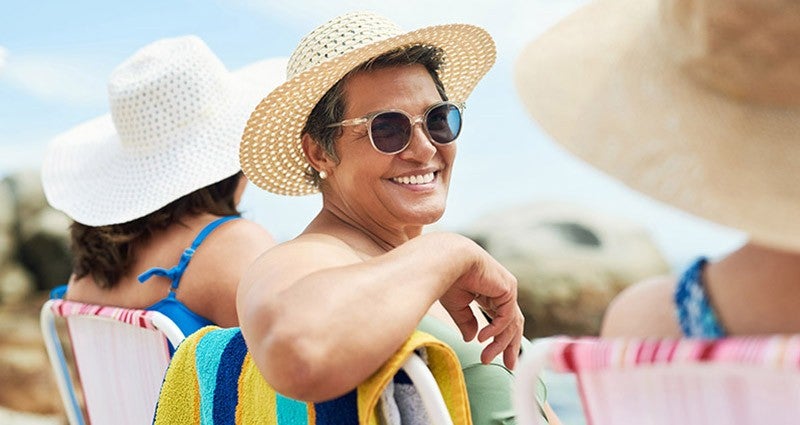Getting better with age: 5 ways to grow older with meaning

Aging is something we all have in common. It’s a natural part of life. So are the changes it brings to our minds and bodies. Even though we may miss some aspects of our more youthful days, there’s much to appreciate about getting older. In fact, we can turn our experiences into fuel to help us live even better in the future.
5 ways to grow better with age
1. Grow old expectantly
Become a lifelong learner. Be present and engaged. Expect to discover something new every day! Activating your mind may even benefit your brain. Findings from observational studies suggest some mentally stimulating activities will keep your thinking skills sharp and may lower the risk of age-related cognitive and memory impairment.1
With age comes more insight and experience. Studies have shown that older adults have larger vocabularies and more knowledge of what words mean.2 You may want to try putting this knowledge and experience to practice. See where it takes you!
Revisit topics. Read books and blogs. Take classes. Play games. Learn a new hobby or skill, or even teach one that you have mastered. Opportunities for keeping your mind active and learning are virtually everywhere.
2. Grow old gratefully
Perspective is powerful. Having a thankful, positive outlook has been linked with improved overall mental and physical health. Gratitude and optimism have been positively related to a number of physiological and psychological benefits.3 Increasing optimism may help extend life and improve well-being in older adults.4
Optimism and gratitude go hand-in-hand. We become more optimistic when we are thankful for what we have. Choose to focus on all that’s good over all that’s bad. If we look hard enough, we can most likely find good in every situation.
Ways to practice gratitude:
- Make it a point to thank at least one person for something every day.
- At dinner or before going to bed, recall three good things that happened that day.
- Try to catch negative thoughts and see if you can turn them into positive ones.
- Journal about positive experiences. Then, revisit this journal to remind yourself of all the good.
- Make eye contact and smile at people you interact with.
3. Grow old mindfully
Life is a gift. Make the most of each moment. We can be mindful by paying attention to what is happening right now. What do you feel? What is going on in your surroundings? What sensations are you experiencing? Take a break from doing to just be and breathe.
Being mindful can lower blood pressure, improve sleep and help with symptoms of depression.5
Want help to be more mindful? Try our Mental Health support.
4. Grow old fruitfully
Volunteer. Share your experience and wisdom with others. Volunteering can give purpose. It can also help you feel connected. And, it may have actual health benefits.6
There are many opportunities for volunteering. Check with your local nonprofits, library and associations.
5. Grow old healthily
Do your best to keep your physical body healthy. Exercise regularly, eat healthy foods and schedule regular check-ups with your primary care doctor.7 If you don’t already have a primary care doctor, consider finding one. Our Primary Care services make it easy.
Also, be sure to take good care of your skin.
Practice these age-defying skincare tips:8
- Apply creamy moisturizer at least twice a day, every day
- Gently wash your face with warm water and mild, non-abrasive cleanser twice a day
- Wear sunscreen that’s at least 30 SPF whenever outdoors
- Don’t smoke or use tobacco products
- Eat healthy foods and stay hydrated
- Don’t tan indoors
- Get enough rest
Get help for your health journey
It’s important that you can access care when and where you need it. We provide help for your whole body. Create an account to call on us anytime.
Learn more about your skin and how to care for it.
1https://www.nia.nih.gov/health/cognitive-health-and-older-adults#mind
2https://www.nia.nih.gov/health/how-aging-brain-affects-thinking
3https://www.ncbi.nlm.nih.gov/pmc/articles/PMC9070006/
4https://www.nia.nih.gov/news/optimism-linked-longevity-and-well-being-two-recent-studies
5https://newsinhealth.nih.gov/2021/06/mindfulness-your-health
6https://www.ncbi.nlm.nih.gov/pmc/articles/PMC7375895/
7https://www.nia.nih.gov/health/healthy-aging-tips-older-adults-in-your-life
8https://www.aad.org/public/everyday-care/skin-care-basics/care/skin-care-in-your-40s-and-50s
Was this article helpful?
Don't wait! Unlock a healthy, happy new year, at no cost to you.
This content is not intended to be a substitute for professional medical advice, diagnosis or treatment. Always seek the advice of your physician or other qualified health provider with any questions you may have regarding a medical condition.
